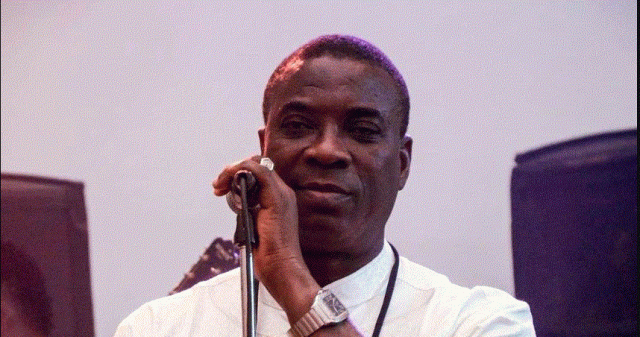Aviation experts have criticised the breach of airport regulations that resulted in the controversial handling of popular Fuji musician Wasiu Ayinde, also known as Kwam 1, by officials of the Nigeria Civil Aviation Authority (NCAA) and the Federal Airports Authority of Nigeria (FAAN), at the domestic terminal of the Nnamdi Azikiwe International Airport in Abuja.
PREMIUM TIMES earlier reported that the Federal Airports Authority of Nigeria (FAAN), in a statement signed by its spokesperson Obiageli Orah, accused 68-year-old Kwam 1, a renowned musician and close associate of President Bola Tinubu, of carrying an alcoholic beverage onto a ValueJet Airlines morning flight (Flight VK 201) to Lagos on Wednessday.
Subsequently, the Nigeria Civil Aviation Authority (NCAA) expressed its plan to blacklist Kwam 1 for six months over his conduct.
Experts who spoke to PREMIUM TIMES Thursday afternoon described the Fuji star’s conduct at the airport runway as a “mystery”.
A former Director General of the Nigerian Airspace Management Agency (NAMA), Roland Iyayi, and retired captain and ex-Military Commandant of Murtala Muhammed Airport, John Ojikutu, expressed concerns about how Kwam 1 bypassed all the checking points at the airport.
Security Breach
Mr Iyayi stated that there are many checkpoints the Fuji icon must have bypassed, like ticket points, security checks, boarding lounge before getting to the runway.
“We only saw a video of Kwam 1 in front of the plane; we don’t know what transpired before he could get there, so this is a lapse on the part of all agencies involved, and a thorough investigation will make this clearer.
“At the security and other checks, you will be asked if you carry anything that might be injurious to other passengers. If you say yes, the security personnel have to check your luggage, and the items must be scrutinized regardless of the containment of the flask. You are only allowed to proceed with your journey upon the official’s approval,” the ex-NAMA boss said.
Speaking of the international and local regulations involved in airport management concerning the issue, Mr Iyayi said penalties for any airport offenses are entrenched in the NCAA’s regulations if any party involved is found guilty.
“Different things are guided by each annex; airport facilitation is a separate annex, so in that, the dos and don’ts around the airport are there. Each regulatory authority of each country will be the one to make regulations where penalties are applied to ensure that standards are kept.
“So to establish what the penalty is, then we will need to go into the regulations of the Nigerian Civil Aviation Authority to see the area breached, and the attached penalties,” he explained.
Regulations
He, however, reiterated that the suspended pilots will be reinstated if they acted according to the regulations, though the video suggested they acted unprofessionally.
“The actions of the pilots were so unprofessional and prone to risks to people around the plane, as seen in the video. Pilots are only meant to start the engine upon the flagman’s approval; by that time, every individual on the plane’s foot must have been dispersed.
“However, if their action aligns with the airport’s regulations, they will be reinstated; otherwise, they might even be redirected to take additional training before they will be allowed to handle planes in the future,” he explained.
According to the National Civil Aviation Security Programme (NCASP) Liquids Rule, passengers are prohibited from carrying liquids exceeding 100 ml through security screening, unless medically necessary and properly declared. This also aligns with international aviation security standards under ICAO Annex 17.
Additionally, according to the Nigerian Civil Aviation Regulations (Nig.CARs), the actions of the Fuji musician, popularly known as Kwam 1, may constitute a violation of established aviation safety standards.
Section 1.3 of the implementing standards under Nig.CARs Part 1 classifies unprofessional or unsafe conduct, such as refusal to comply with security screening, spilling liquid on airport personnel, or resisting instructions from crew or security officers, as breaches of aviation rules.
Also, in part 8, Nig.CARs, Operations (Ground Safety Protocols), states that aircraft movement and ground operations must be well guided to avoid pilots’ unsafe initiation of taxiing.
Lapses
In a similar interview, the ex-Military Commandant of Murtala Muhammed Airport, John Ojikutu, said FAAN and other agencies have the responsibility to portray how the musician got to the runway while he is yet to be cleared off at the checkpoints.
The aviation expert criticised the Nigerian airport security system for the lapses that led to Kwam 1 gaining access to an aircraft with a liquid substance, allegedly alcohol, despite strict aviation regulations. He noted that the Fuji icon might have bypassed the checkpoints based on his social stature.
“From the moment he entered the airport, collected his boarding pass, and walked to the aircraft, Kwam 1 would have passed through at least three mandatory checkpoints: the access control point, the screening point, and the secondary screening at the boarding gate.
“At the screening point, all passengers are checked thoroughly, sometimes even asked to remove their shoes. No one is allowed to carry any kind of liquid, not just water, through that point. So how did he get through?” the ex-Military Commandant queried.
Mr Ojikutu emphasised that every agency involved, from FAAN to the airline and security officers, bears responsibility for the breach.
“All these agencies are exposing themselves. Everyone is guilty. They are now making it look like they are working. How did Kwam 1 pass? It could have been anybody.
“If proper screening had been done, he would never have reached the aircraft with that flask. Even at the boarding gate, there is a secondary screening handled by the airline. So, how did the substance pass through both FAAN and the airline’s checkpoints?” the ex-military commandant said.
He noted that there is a possibility the liquid-filled flask was smuggled through a backdoor access point, a serious security breach that, he stressed, must be thoroughly investigated and addressed.
On the part of airport officials, Mr Ojikutu stated that even as the aircraft prepared for take-off, standard protocols appeared to be ignored.
“There’s always a dispatcher on the ground and a marshal who confirms that everything is in order before the pilot taxis the aircraft. That means the pilot also failed to follow procedure. Everyone involved in this chain: FAAN, the airline, the flight crew, and airport security — should be held accountable.”
The aviation expert also confirmed that all operational steps and screening procedures are regulated under NCAA-approved security programmes.
“Each agency has its security programme approved by the Nigerian Civil Aviation Authority (NCAA). FAAN is responsible for at least two of the screening layers, at the access point and the main screening area. The airline is responsible for the secondary screening before boarding.
“There are six screening layers of security checks in total, about three of them are with FAAN, about two are with the airlines, including ticket verification. If any of these had been properly enforced, this incident wouldn’t have occurred,” he stated.
READ ALSO: Mixed reactions trail KWAM 1s suspension by Nigerian aviation authorities
Mr Ojikutu recalled that the minister of aviation in 2007 had similar airport issues while he was on duty, and that it is a common culture among politicians.
“The Minister of Aviation in 2007 refused secondary screening, and I did not allow him to board the aircraft. We met in a meeting and he raised the issue. I told him even if it’s Obasanjo that entered British Airways and the British government is not told, and the ambassador didn’t get to welcome him in boarding kits, they will screen him,” he said.
He concluded by describing the incident as a “national embarrassment” and a warning sign of deeper regulatory negligence within Nigeria’s aviation security framework.









